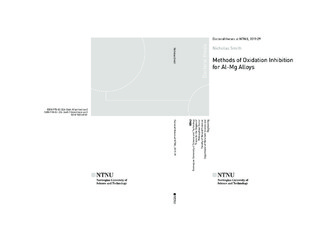Methods of Oxidation Inhibition for Al-Mg Alloys
Doctoral thesis
Permanent lenke
http://hdl.handle.net/11250/2586133Utgivelsesdato
2019Metadata
Vis full innførselSamlinger
Sammendrag
The oxidation of aluminum will occur at any notable oxygen partial pressure. This oxidation can be favorable as it forms a protective layer on the metal surface which prevents further oxidation. However, the addition of a few percent of magnesium to an aluminum alloy is known to change the protective abilities of the oxide layer. As a result aluminum-magnesium alloys are known to suffer from problematic oxidation especially at temperatures above the melting point. During the production of aluminum in the casthouse the metal is held in a liquid state for up to several hours. Significant oxidation can occur during this time especially on magnesium containing alloys. The oxidation may cause further problems if it occurs after the final filtering step as any formed oxide may end up in the final casting. As magnesium containing alloys are prone to rapid oxidation the final casting will have a larger amount of oxide inclusions and potentially reduced mechanical properties as a result.
Beryllium has historically been used by the aluminum industry in ppm levels to help limit the oxidation of these aluminum-magnesium alloys. Despite nearly 100 years of usage the fundamentals behind the protective mechanism provided by beryllium was not clearly understood. This is primarily due to the difficulties in accurately detecting light elements, like beryllium, especially at low concentrations. The downside to berylliums usage is that it is known to have severe negative health consequences for humans. In order to facilitate finding an alternative to beryllium the protective mechanism was investigated. Further, the alternative oxidation protective method of CO2 and alternative alloying elements was studied.
Through thermogravimetric studies, electron microscopy and x-ray photoelectron spectroscopy the oxide layers on aluminum alloys containing 5 % magnesium with and without beryllium were investigated. It was found that the addition of beryllium to the alloy slowed the growth of the oxide layer by formation of a beryllium containing oxide layer at the oxide-metal interface. This oxide layer slowed the diffusion of magnesium out and delayed the transformation of the MgO layer to a MgAl2O4 layer which results in a rapid increase in the oxidation rate.
Using the same methods used to study beryllium containing alloys it was shown that the addition of as little as 5 % CO2 to the air protected the melt as well as beryllium. It was found that the CO2 adsorbed onto the oxide surface and modified the structure of the oxide resulting a barrier to the outward diffusion of magnesium, thus slowing the oxidation. Ppm additions of yttrium, erbium or strontium were ineffective in inhibiting the oxidation as they were unable to form a protective layer at the oxide-metal interface.
Består av
Paper 1: Smith, Nicholas; Gleeson, Brian; Kvithyld, Anne; Tranell, Gabriella. Effects of 2 ppm Beryllium on the Oxidation of a 5XXX Aluminum Alloy at Temperatures Between 500 and 750 °C. I: Light metals 2017. https://doi.org/10.1007/978-3-319-51541-0_175Paper 2: Smith, Nicholas; Kvithyld, Anne; Tranell, Gabriella. XPS Examination of the Oxide-Metal interface of an Al-Mg Alloy Containing Beryllium. I: Light Metals 2018. Springer Publishing Company 2018 s. 913-919 https://doi.org/10.1007/978-3-319-72284-9_119
Paper 3: Smith, Nicholas; Kvithyld, Anne; Tranell, Gabriella. The Mechanism Behind the Oxidation Protection of High Mg Al Alloys with Beryllium. Metallurgical and materials transactions. B, process metallurgy and materials processing science 2018 ;Volum 49.(5) s. 2846-2857 This is an open access article distributed under the terms of the Creative Commons CC BY license https://doi.org/10.1007/s11663-018-1340-6
Paper 4: Smith, Nicholas Albert; Gleeson, Brian; wissam, saidi; Kvithyld, Anne; Tranell, Gabriella. Mechanism behind the Inhibiting Effect of CO2 on the Oxidation of Al−Mg Alloys. - The final published version in Industrial & Engineering Chemistry Research 58 (3), pp 1434–1442 https.//doi.org/10.1021/acs.iecr.8b04691
Paper 5: Smith, Nicholas Albert; Gleeson, Brian; wissam, saidi; Kvithyld, Anne; Tranell, Gabriella. Effects of CO2 cover gas and yttrium additions on the oxidation of AlMg alloys. The final published version I: Light Metals 2019 https://doi.org/10.1007/978-3-030-05864-7
